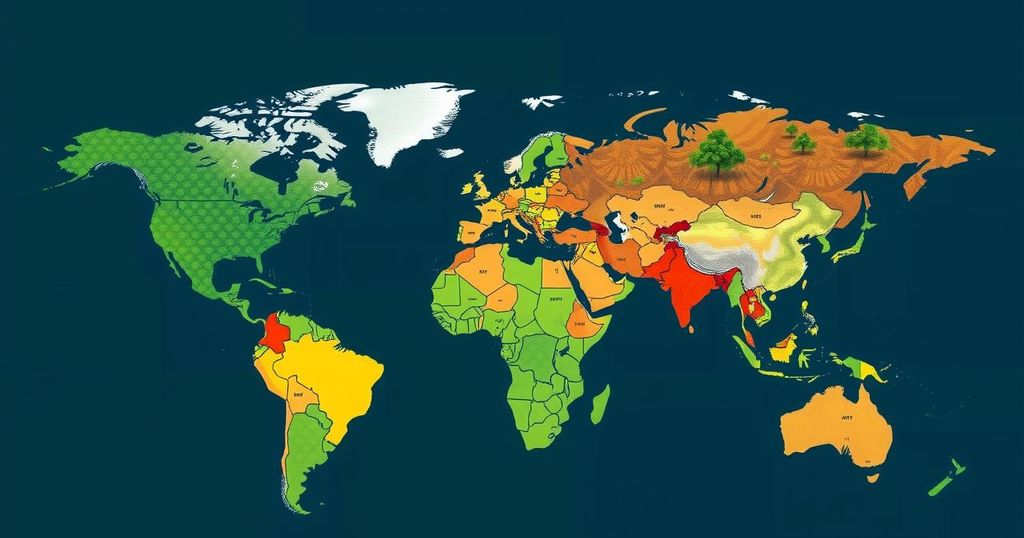Richer nations are beginning to compensate poorer countries for climate change damages, illustrated by the case of Christopher Bingala in Malawi, who received a payment after Cyclone Freddy. Approximately $720 million has been pledged for these efforts, but experts warn it is insufficient given the increasing severity of climate disasters. As negotiations continue, the need for expanded funding and innovative support strategies is more crucial than ever.
In the aftermath of Cyclone Freddy, the longest-lasting tropical cyclone on record, Christopher Bingala lost his home and livestock to devastating floodwaters in Malawi. Struggling as a subsistence farmer, he received a crucial payment of approximately $750 under a new climate compensation fund aimed at aiding low-income countries facing severe climate changes. Through this assistance, Bingala was able to rebuild his home, marking a vital step in adapting to the increasing climate-related disasters that disproportionately affect poorer nations, despite their minimal contributions to global pollution.
The global effort to compensate for climate-induced damages began last year, with wealthier nations pledging around $720 million to assist developing countries. This initiative acknowledges the reality that nations such as Malawi are experiencing intensified storms and droughts without having largely contributed to greenhouse gas emissions. As climate negotiations continue at COP29, leaders, including Philip Davis, Prime Minister of the Bahamas, are urging wealthier nations to take responsibility for their role in exacerbating climate issues.
Bingala’s story is emblematic of a broader crisis, as Cyclone Freddy displaced approximately 650,000 people in Malawi alone, overwhelming existing support systems. After receiving financial assistance facilitated by Scotland’s pioneering loss and damage funding initiative, Bingala and others utilized the funds to invest in housing, agricultural resources, and education for their children, showcasing the importance of direct monetary support.
In Malawi, a pilot program funded by GiveDirectly has provided cash grants, allowing affected families to regain their footing in the aftermath of climatic hardships. While these efforts are commendable, they merely scratch the surface of the required funding, which, according to estimates, may balloon to $250 billion annually by 2030 due to escalating climate events.
Looking forward, many low-income countries advocate that these funds should not solely address disaster recovery but include investments for community relocations and cultural preservation. According to Prime Minister Davis, effective action from wealthier nations is essential to curb the negative consequences of climate change that do not respect borders.
In conclusion, the necessity for a robust financial framework to support developing nations affected by climate change is paramount. The efforts to establish loss and damage compensation highlight a critical step towards recognizing the disproportionate impacts of climate change on poorer communities. Financial assistance initiatives such as those seen in Malawi exemplify how targeted funding can help families rebuild and adapt.
Climate change disproportionately impacts low-income countries that contribute minimally to global emissions. The creation of a fund for loss and damage compensation represents a significant achievement in international climate agreements, reflecting a growing recognition of the need for wealthier nations to support developing nations grappling with increasing disasters. The payment of $750 to families in Malawi following Cyclone Freddy exemplifies the tangible benefits of this funding initiative. As climate-related disasters escalate, the demands for robust financial assistance continue to rise.
To address pressing climate challenges, the establishment of loss and damage funding is essential, particularly for vulnerable low-income nations. This funding not only supports immediate recovery efforts but also emphasizes the responsibility of wealthier nations to recognize their contributions to global warming and its repercussions. The ongoing discussions at COP29 and the actions of governments like Scotland’s represent a critical juncture in international climate collaboration.
Original Source: www.wmuk.org






